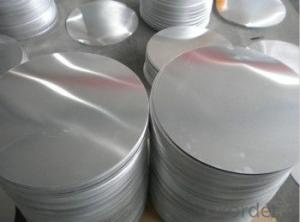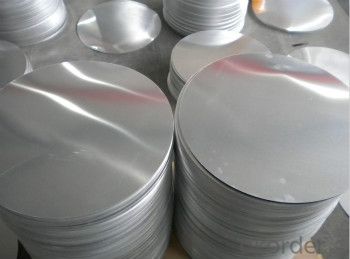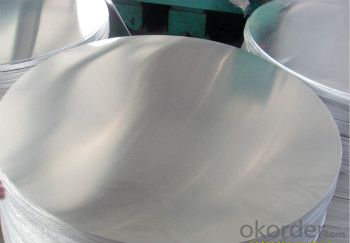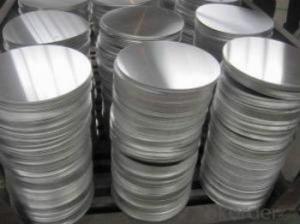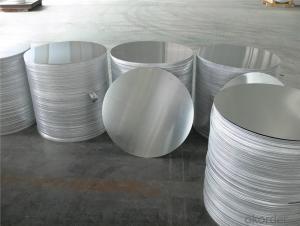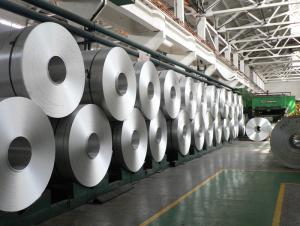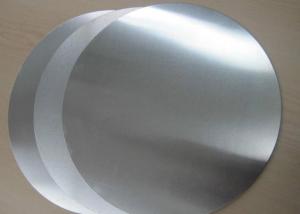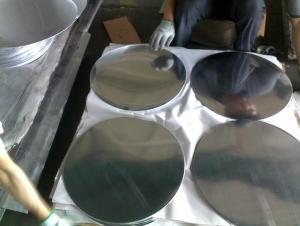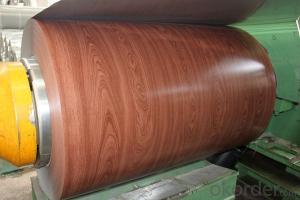Black Aluminum Coil Stock Continuous Casting Aluminium Circle AA3003
- Loading Port:
- Shanghai
- Payment Terms:
- TT OR LC
- Min Order Qty:
- 5 m.t.
- Supply Capability:
- 2000 m.t./month
OKorder Service Pledge
OKorder Financial Service
You Might Also Like
Specification
1. Structure of CC Aluminium in Coil Form for making Aluminium Circle Description
CC Aluminium in Coil Form for making Aluminium Circle is one semi-finished aluminium material. This coil can be rolled down to aluminium coil,sheet,circle ect. The alloy AA1050 is widly used in building, industry ect. Its weight is much lower than steel. So many customers choosed aluminium material instead of steel.
2. Feature of CC Aluminium in Coil Form for making Aluminium Circle
Surfact Quality :
Be free from Oil Stain, Dent, Inclusion, Scratches, Stain, Oxide Dicoloration, Breaks, Corrosion, Roll Marks, Dirt Streaks and other defect which will interfere with use,
Mechenical Property:
Chemical Composite and Mechanical Property
3. Image of CC Aluminium in Coil Form for making Aluminium Circle
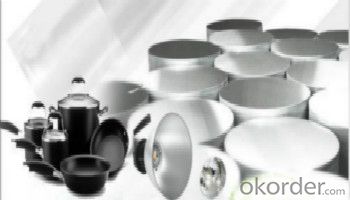
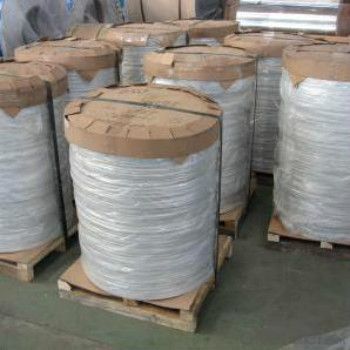
4. Specification of CC Aluminium in Coil Form for making Aluminium Circle
Aluminum Coil/Sheet | |
Main Specification | |
Alloy | AA1xxx (AA1050, AA1060, AA1070, AA1100 etc.) |
AA3xxx (AA3003, AA3004, AA3005, AA3105 etc.) | |
AA5xxx, AA6XXX (AA5052,AA5083, AA5754, AA6061, AA6062 etc.) | |
AA8xxx(AA8011, AA8006 etc.) | |
Temper | H14,H16, H18, H22, H24, H26, H32,O/F, T4, T6, T651 |
Thickmess | 0.01mm-100mm |
Width | 30mm-1700mm |
Standard | GB/T 3880-2006/ASTM |
Special specification is available on customer's requirement | |
5. FAQ
1) What is the delivery time?
Depends on actual order, around 20 to 35 days
2) What is the QC system:
We have QC staff of 20 persons and advanced equipment, each production is with MTC traced from Aluminum ingot lot.
3) What market do you mainly sell to?
Australia, America, Asia, Middle East, Western Europe, Africa etc
4)What about payment term?
30% T/T in advance, balance against B/L COPY.
- Q: Can aluminum coils be used for window frames?
- Certainly, window frames can indeed be made using aluminum coils. Aluminum is widely favored for window frames owing to its enduring nature, lightweight composition, and ability to resist corrosion. It is extensively employed in both residential and commercial settings. Aluminum coils can be effortlessly molded and adjusted to accommodate diverse window dimensions and designs. Additionally, aluminum frames provide exceptional thermal insulation qualities, thereby enhancing energy efficiency in structures. All in all, aluminum coils represent a dependable and pragmatic choice for constructing window frames.
- Q: How are aluminum coils cleaned before further processing?
- To guarantee the elimination of any contaminants or impurities, aluminum coils undergo a series of steps for cleaning prior to further processing. The cleaning process entails the utilization of chemical solutions and mechanical techniques. Initially, the coils are immersed in a degreaser or cleaning solution to dissolve and eradicate any oils, greases, or dirt present on the surface. This stage is essential in eradicating organic contaminants that may hinder subsequent processes. Following the soaking, the coils typically undergo a high-pressure water rinse to eliminate any remaining residues or particles. This step aids in dislodging and flushing out loosened contaminants from the coil surface. In certain instances, a combination of chemical cleaning and mechanical scrubbing or brushing may be employed to effectively eliminate stubborn or baked-on contaminants. This method is particularly beneficial for coils exposed to harsh environmental conditions or industrial processes. Once the coils have been cleaned, they are typically rinsed again to ensure complete removal of any cleaning agents or residues. This is crucial to prevent any adverse effects or interference with subsequent processing stages. Overall, the cleaning of aluminum coils prior to further processing plays a vital role in achieving high-quality end products. It ensures impurity removal, enhances the surface finish, and improves the overall performance and lifespan of the finished aluminum products.
- Q: Can aluminum coils be used in the production of signage?
- Yes, aluminum coils can be used in the production of signage. Aluminum is a popular material choice for signage due to its durability, lightweight nature, and resistance to corrosion. The coils can be easily shaped and formed into various sign types, including flat panels, channel letters, and more. Additionally, aluminum can be coated or painted to achieve different colors and finishes, making it a versatile option for signage production.
- Q: How do aluminum coils contribute to lightweight vehicle design?
- Aluminum coils contribute to lightweight vehicle design by providing a lightweight and strong material for various components, such as the body panels, frame, and suspension parts. The use of aluminum coils reduces the overall weight of the vehicle, improving fuel efficiency, handling, and performance while also potentially reducing emissions.
- Q: Are aluminum coils suitable for signage applications?
- Yes, aluminum coils are suitable for signage applications. They are durable, lightweight, and resistant to corrosion, making them ideal for outdoor signage. Additionally, aluminum coils can be easily shaped and molded, allowing for various design possibilities in signage applications.
- Q: What are the different alloy compositions used in aluminum coils?
- There are several different alloy compositions used in aluminum coils, including 1xxx series (pure aluminum), 3xxx series (aluminum-manganese), 5xxx series (aluminum-magnesium), and 8xxx series (aluminum-lithium). Each alloy composition offers unique properties and characteristics, making them suitable for various applications in industries such as automotive, construction, and aerospace.
- Q: Can aluminum coils be used in automotive manufacturing?
- Automotive manufacturing can indeed utilize aluminum coils. Aluminum, a versatile and lightweight substance, presents several advantages within the automotive sector. Frequently employed for fabricating components such as body panels, engine blocks, wheels, and heat exchangers, aluminum's incorporation in automotive manufacturing enhances fuel efficiency by reducing vehicle weight and subsequently minimizing energy consumption. Furthermore, aluminum boasts exceptional resistance to corrosion, rendering it appropriate for deployment in diverse weather conditions. In conclusion, the extensive benefits associated with the utilization of aluminum coils in automotive manufacturing have led to its widespread adoption by numerous car manufacturers.
- Q: I need to write as many interesting facts as i can about aluminum for a thing for school, any help?
- indexed here are some exciting generally non exciting info related to the factor Al, its is a metalloid, a comparatively severe density, malleable, that is drawn into twine, stable conductors of electric energy, can mirror warmth and gentle-weight, remains a stable room temperature (25 levels celsius), does not comfortably combine with different metalloids yet combines with non metals. exciting fact a steel and a non steel have the applications to create a salt. Al. guard homes of the two steel and non-steel homes. such homes of non metals are comfortable and fragile, low melthing factors, combine with metals,undesirable conductors for warmth and electrical energy, have little luster and have low melting factors.
- Q: Are aluminum coils suitable for architectural applications?
- Yes, aluminum coils are commonly used in architectural applications due to their durability, lightweight nature, corrosion resistance, and versatility in design options. They are often used in roofing, siding, facades, and other architectural elements, offering a long-lasting and aesthetically pleasing solution.
- Q: Are there any limitations to the maximum coil length of aluminum coils?
- The maximum length of aluminum coils is subject to certain limitations. Factors that affect the maximum coil length include the thickness and width of the coil, the strength and tensile properties of the aluminum alloy, the equipment used for coil processing, and the intended application of the coil. One limitation is the strength and ductility of the aluminum alloy. Aluminum alloys with higher strength and lower ductility may have restrictions on the maximum coil length due to the risk of coil breakage or deformation during processing or handling. Another limitation is the coil processing equipment. The maximum coil length is often determined by the size and capabilities of the equipment used for slitting, cutting, or forming the coils. If the equipment has limited capacity or is not designed for longer coils, it may not be able to effectively handle or process longer lengths. The intended application of the coil can also impose limitations. For example, in the automotive industry, there may be restrictions on the maximum coil length based on the size and weight limitations of the vehicles. Moreover, logistical factors such as transportation and storage can also impose limitations. Longer coils may be more challenging to handle, transport, and store, which can increase the risk of damage or pose challenges in terms of logistics and space requirements. Therefore, it is crucial to consider various factors such as alloy properties, equipment capabilities, application requirements, and logistical considerations to determine the practical limitations of coil length for a specific situation, as there is no specific universal limit to the maximum coil length of aluminum coils.
Send your message to us
Black Aluminum Coil Stock Continuous Casting Aluminium Circle AA3003
- Loading Port:
- Shanghai
- Payment Terms:
- TT OR LC
- Min Order Qty:
- 5 m.t.
- Supply Capability:
- 2000 m.t./month
OKorder Service Pledge
OKorder Financial Service
Similar products
Hot products
Hot Searches
Related keywords
